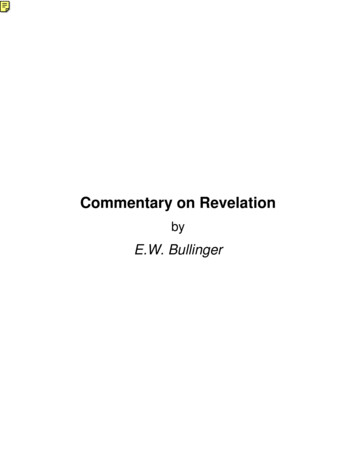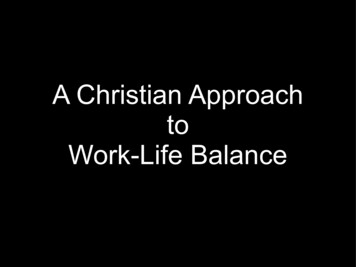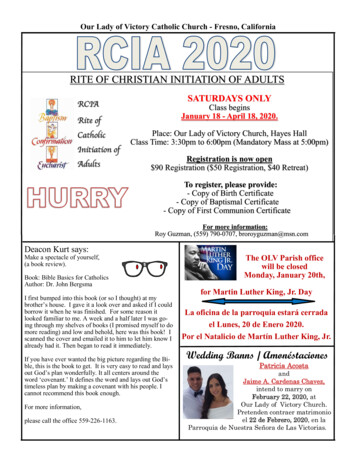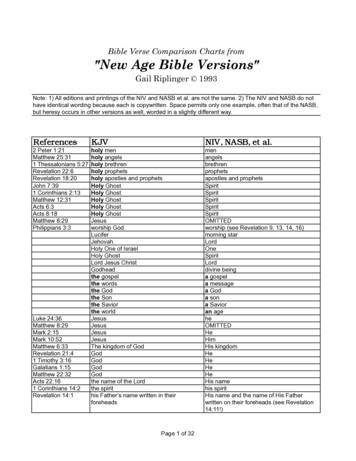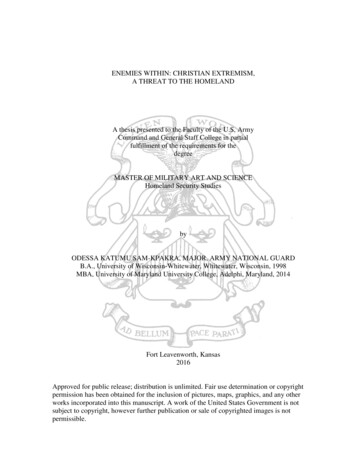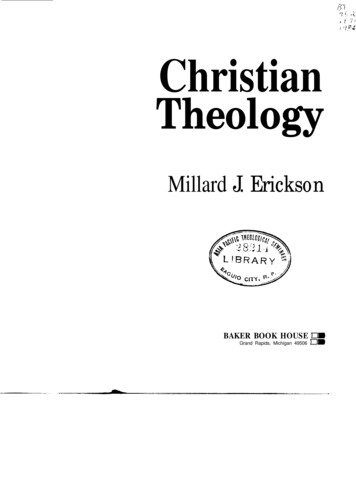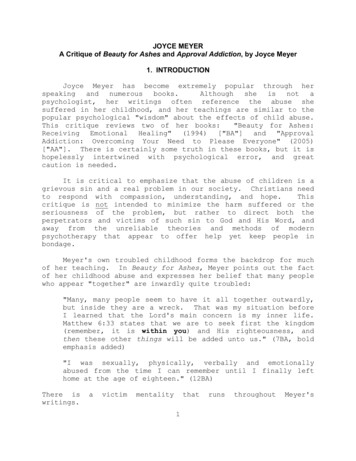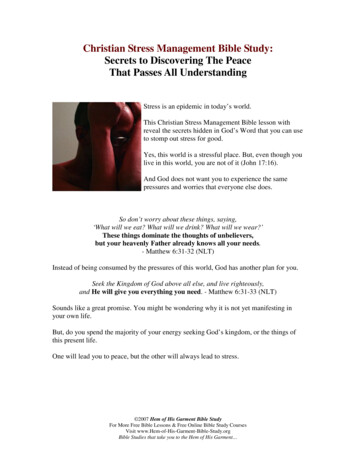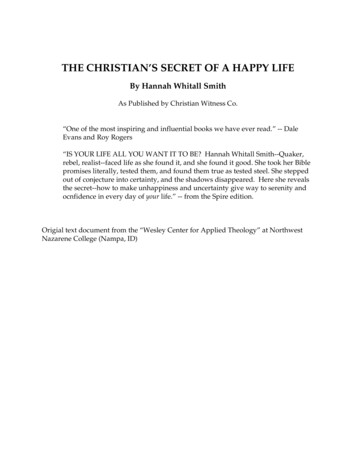
Transcription
THE CHRISTIAN’S SECRET OF A HAPPY LIFEBy Hannah Whitall SmithAs Published by Christian Witness Co.“One of the most inspiring and influential books we have ever read.” -- DaleEvans and Roy Rogers“IS YOUR LIFE ALL YOU WANT IT TO BE? Hannah Whitall Smith--Quaker,rebel, realist--faced life as she found it, and she found it good. She took her Biblepromises literally, tested them, and found them true as tested steel. She steppedout of conjecture into certainty, and the shadows disappeared. Here she revealsthe secret--how to make unhappiness and uncertainty give way to serenity andocnfidence in every day of your life.” -- from the Spire edition.Origial text document from the “Wesley Center for Applied Theology” at NorthwestNazarene College (Nampa, ID)
2ContentsChapter 1 Introductory. -- God’s Side and Man’s SideChapter 2 The Scripturalness of This LifeChapter 3 The Life DefinedChapter 4 How To Enter InChapter 5 Difficulties Concerning ConsecrationChapter 6 Difficulties Concerning FaithChapter 7 Difficulties Concerning The WillChapter 8 Is God in Everything?Chapter 9 GrowthChapter 10 ServiceChapter 11 Difficulties Concerning GuidanceChapter 12 Concerning TemptationChapter 13 FailuresChapter 14 DoubtsChapter 15 Practical ResultsChapter 16 The Joy of ObedienceChapter 17 Oneness With ChristChapter 18 “Although” and “Yet”Chapter 19 Kings and Their KingdomsChapter 20 The Chariots of GodChapter 21 “Without Me Ye Can Do Nothing”Chapter 22 “God With Us”; or, The One Hundred and Thirty-ninth Psalm
3THE CHRISTIAN’S SECRET OF A HAPPY LIFEBy Hannah Whitall SmithPrefaceThis is not a theological book. I frankly confess I have not been trained in theologicalschools, and do not understand their methods nor their terms. But the Lord has taughtme experimentally and practically certain lessons out of his Word, which have greatlyhelped me in my Christian life, and have made it a very happy one. And I want to tellmy secret, in the best way I can, in order that some others may be helped into a happylife also.I do not seek to change the theological views of a single individual. I dare say most ofmy readers know far more about theology than I do myself, and perhaps may discoverabundance of what will seem to be theological mistakes. But let me ask that these maybe overlooked, and that my reader will try, instead, to get at the experimental point ofthat which I have tried to say, and if that is practical and helpful, forgive the blunderingway in which it is expressed. I have tried to reach the absolute truth which lies at thefoundation of all “creeds” and “views,” and to bring the soul into those personalrelations with God which must exist alike in every form of religion, let the expression ofthem differ as they may.I have committed my book to the Lord, and have asked Him to counteract all in it that iswrong, and to let only that which is true find entrance into any heart. It is sent out intender sympathy and yearning love for all the struggling, weary ones in the Church ofChrist, and its message goes right from my heart to theirs. I have given the best I have,and could do no more. May the blessed Holy Spirit use it to teach some of my readersthe true secret of a happy life!HANNAH WHITALL SMITH, GERMANTOWN, PENNSYLVANIA.
4Chapter 1INTRODUCTORYGOD’S SIDE AND MAN’S SIDEIn introducing this subject of the life and walk of faith, I desire, at the very outset, toclear away one misunderstanding which very commonly arises in reference to theteaching of it, and which effectually hinders a clear apprehension of such teaching. Thismisunderstanding comes from the fact that the two sides of the subject are rarely keptin view at the same time. People see distinctly the way in which one side is presented,and, dwelling exclusively upon this, without even a thought of any other, it is nowonder that distorted views of the whole matter are the legitimate consequence.Now there are two very decided and distinct sides to this subject, and, like allother subjects, it cannot be fully understood unless both of these sides are keptconstantly in view. I refer, of course, to God’s side and man’s side; or, in other words, toGod’s part in the work of sanctification, and man’s part. These are very distinct andeven contrastive, but are not contradictory; though, to a cursory observer, theysometimes look so.This was very strikingly illustrated to me not long ago. There were two teachersof this higher Christian life holding meetings in the same place, at alternate hours. Onespoke only of God’s part in the work, and the other dwelt exclusively upon man’s part.They were both in perfect sympathy with one another, and realized fully that they wereeach teaching different sides of the same great truth; and this also was understood by alarge proportion of their hearers. But with some of the hearers it was different, and onelady said to me, in the greatest perplexity, “I cannot understand it at all. Here are twopreachers undertaking to teach just the same truth, and yet to me they seem flatly tocontradict one another.” And I felt at the time that she expressed a puzzle which reallycauses a great deal of difficulty in the minds of many honest inquirers after this truth.Suppose two friends go to see some celebrated building, and return home todescribe it. One has seen only the north side, and the other only the south. The firstsays, “The building was built in such a manner, and has such and such stories andornaments.” “Oh, no!” says the other, interrupting him, “you are altogether mistaken; Isaw the building, and it was built in quite a different manner, and its ornaments andstories were so and so.” A lively dispute would probably follow upon the truth of therespective descriptions, until the two friends discover that they have been describingdifferent sides of the building, and then all is reconciled at once.I would like to state as clearly as I can what I judge to be the two distinct sides inthis matter; and to show how the looking at one without seeing the other, will be sure tocreate wrong impressions and views of the truth.To state it in brief, I would just say that man’s part is to trust and God’s part is towork; and it can be seen at a glance how contrastive these two parts are, and yet notnecessarily contradictory. I mean this. There is a certain work to be accomplished. Weare to be delivered from the power of sin, and are to be made perfect in every goodwork to do the will of God. “Beholding as in a glass the glory of the Lord,” we are to be
5actually “changed into the same image from glory to glory, even as by the Spirit of theLord.” We are to be transformed by the renewing of our minds, that we may provewhat is that good and acceptable and perfect will of God. A real work is to be wroughtin us and upon us. Besetting sins are to be conquered. Evil habits are to be overcome.Wrong dispositions and feelings are to be rooted out, and holy tempers and emotionsare to be begotten. A positive transformation is to take place. So at least the Bibleteaches. Now somebody must do this. Either we must do it for ourselves, or anothermust do it for us. We have most of us tried to do it for ourselves at first, and havegrievously failed; then we discover from the Scriptures and from our own experiencethat it is a work we are utterly unable to do for ourselves, but that the Lord Jesus Christhas come on purpose to do it, and that He will do it for all who put themselves whollyinto His hand, and trust Him to do it. Now under these circumstances, what is the partof the believer, and what is the part of the Lord? Plainly the believer can do nothing buttrust; while the Lord, in whom he trusts, actually does the work intrusted to Him.Trusting and doing are certainly contrastive things, and often contradictory; but arethey contradictory in this case? Manifestly not, because it is two different parties thatare concerned. If we should say of one party in a transaction that he trusted his case toanother, and yet attended to it himself, we should state a contradiction and animpossibility. But when we say of two parties in a transaction that one trusts the otherto do something, and that that other goes to work and does it, we are making astatement that is perfectly simple and harmonious. When we say, therefore, that in thishigher life, man’s part is to trust, and that God does the thing intrusted to Him, we donot surely present any very difficult or puzzling problem.The preacher who is speaking on man’s part in this matter cannot speak ofanything but surrender and trust, because this is positively all the man can do. We allagree about this. And yet such preachers are constantly criticised as though, in sayingthis, they had meant to imply there was no other part, and that therefore nothing buttrusting is done. And the cry goes out that this doctrine of faith does away with allrealities, that souls are just told to trust, and that is the end of it, and they sit downthenceforward in a sort of religious easy-chair, dreaming away a life fruitless of anyactual results. All this misapprehension arises, of course, from the fact that either thepreacher has neglected to state, or the hearer has failed to hear, the other side of thematter; which is, that when we trust, the Lord works, and that a great deal is done, notby us, but by Him. Actual results are reached by our trusting, because our Lordundertakes the thing trusted to Him, and accomplishes it. We do not do anything, butHe does it; and it is all the more effectually done because of this. The puzzle as to thepreaching of faith disappears entirely as soon as this is clearly seen.On the other hand, the preacher who dwells on God’s side of the question iscriticised on a totally different ground. He does not speak of trust, for the Lord’s part isnot to trust, but to work. The Lord does the thing intrusted to Him. He disciplines andtrains the soul by inward exercises and outward providences. He brings to bear all theresources of His wisdom and love upon the refining and purifying of that soul. Hemakes everything in the life and circumstances of such a one subservient to the onegreat purpose of making him grow in grace, and of conforming him, day by day andhour by hour, to the image of Christ. He carries him through a process oftransformation, longer or shorter, as his peculiar case may require, making actual andexperimental the results for which the soul has trusted. We have dared, for instance,
6according to the command in Rom. 6:11, by faith to reckon ourselves “dead unto sin.”The Lord makes this a reality, and leads us to victory over self, by the daily and hourlydiscipline of His providences. Our reckoning is available only because God thus makesit real. And yet the preacher who dwells upon this practical side of the matter, and tellsof God’s processes for making faith’s reckonings experimental realities, is accused ofcontradicting the preaching of faith altogether, and of declaring only a process ofgradual sanctification by works, and of setting before the soul an impossible andhopeless task.Now, sanctification is both a sudden step of faith, and also a gradual process ofworks. It is a step as far as we are concerned; it is a process as to God’s part. By a step offaith we get into Christ; by a process we are made to grow up unto Him in all things. Bya step of faith we put ourselves into the hands of the Divine Potter; by a gradual processHe makes us into a vessel unto His own honor, meet for His use, and prepared to everygood work.To illustrate all this: suppose I were to be describing to a person, who wasentirely ignorant of the subject, the way in which a lump of clay is made into a beautifulvessel. I tell him first the part of the clay in the matter, and all I can say about this is,that the clay is put into the potter’s hands, and then lies passive there, submitting itselfto all the turnings and overturnings of the potter’s hands upon it. There is reallynothing else to be said about the clay’s part. But could my hearer argue from this thatnothing else is done, because I say that this is all the clay can do? If he is an intelligenthearer, he will not dream of doing so, but will say, “I understand. This is what the claymust do; but what must the potter do?” “Ah,” I answer, “now we come to theimportant part. The potter takes the clay thus abandoned to his working, and begins tomould and fashion it according to his own will. He kneads and works it, he tears itapart and presses it together again, he wets it and then suffers it to dry. Sometimes heworks at it for hours together, sometimes he lays it aside for days and does not touch it.And then, when by all these processes he has made it perfectly pliable in his hands, heproceeds to make it up into the vessel he has purposed. He turns it upon the wheel,planes it and smooths it, and dries it in the sun, bakes it in the oven, and finally turns itout of his workshop, a vessel to his honor and fit for his use.”Will my hearer be likely now to say that I am contradicting myself; that a littlewhile ago I had said the clay had nothing to do but lie passive in the potter’s hands, andthat now I am putting upon it a great work which it is not able to perform; and that tomake itself into such a vessel is an impossible and hopeless undertaking? Surely not.For he will see that, while before I was speaking of the clay’s part in the matter, I amnow speaking of the potter’s part, and that these two are necessarily contrastive, but notin the least contradictory, and that the clay is not expected to do the potter’s work, butonly to yield itself up to his working.Nothing, it seems to me, could be clearer than the perfect harmony betweenthese two apparently contradictory sorts of teaching on this subject. What can be saidabout man’s part in this great work, but that he must continually surrender himself andcontinually trust?But when we come to God’s side of the question, what is there that may not besaid as to the manifold and wonderful ways in which He accomplishes the workintrusted to Him? It is here that the growing comes in. The lump of clay would nevergrow into a beautiful vessel if it stayed in the clay-pit for thousands of years. But once
7put into the hands of a skilful potter, and, under his fashioning, it grows rapidly into avessel to his honor. And so the soul, abandoned to the working of the Heavenly Potter,is changed rapidly from glory to glory into the image of the Lord by His Spirit.Having, therefore, taken the step of faith by which you have put yourself whollyand absolutely into His hands, you must now expect Him to begin to work. His way ofaccomplishing that which you have intrusted to Him may be different from your way.But He knows, and you must be satisfied.I knew a lady who had entered into this life of faith with a great outpouring ofthe Spirit, and a wonderful flood of light and joy. She supposed, of course, this was apreparation for some great service, and expected to be put forth immediately into theLord’s harvest field. Instead of this, almost at once her husband lost all his money, andshe was shut up in her own house, to attend to all sorts of domestic duties, with no timeor strength left for any Gospel work at all. She accepted the discipline, and yieldedherself up as heartily to sweep, and dust, and bake, and sew, as she would have done topreach, or pray or write for the Lord. And the result was that through this very trainingHe made her into a vessel “meet for the Master’s use, and prepared unto every goodwork.”Another lady, who had entered this life of faith under similar circumstances ofwondrous blessing, and who also expected to be sent out to do some great work, wasshut up with two peevish invalid nieces, to nurse, and humor, and amuse them all daylong. Unlike the first lady, this one did not accept the training, but chafed and fretted,and finally rebelled, lost all her blessing, and went back into a state of sad coldness andmisery. She had understood her part of trusting to begin with, but not understandingthe divine process of accomplishing that for which she had trusted, she took herself outof the hands of the Heavenly Potter, and the vessel was marred on the wheel.I believe many a vessel has been similarly marred by a want of understandingthese things. The maturity of Christian experience cannot be reached in a moment, butis the result of the work of God’s Holy Spirit, who, by His energizing and transformingpower, causes us to grow up into Christ in all things. And we cannot hope to reach thismaturity in any other way than by yielding ourselves up utterly and willingly to Hismighty working. But the sanctification the Scriptures urge as a present experience uponall believers does not consist in maturity of growth, but in purity of heart, and this maybe as complete in the babe in Christ as in the veteran believer.The lump of clay, from the moment it comes under the transforming hand of thepotter, is, during each day and each hour of the process, just what the potter wants it tobe at that hour or on that day, and therefore pleases him. But it is very far from beingmatured into the vessel he intends in the future to make it.The little babe may be all that a babe could be, or ought to be, and may thereforeperfectly please its mother, and yet it is very far from being what that mother wouldwish it to be when the years of maturity shall come.The apple in June is a perfect apple for June. It is the best apple that June canproduce. But it is very different from the apple in October, which is a perfected apple.God’s works are perfect in every stage of their growth. Man’s works are neverperfect until they are in every respect complete.All that we claim then in this life of sanctification is, that by a step of faith we putourselves into the hands of the Lord, for Him to work in us all the good pleasure of Hiswill; and that by a continuous exercise of faith we keep ourselves there. This is our part
8in the matter. And when we do it, and while we do it, we are, in the Scripture sense,truly pleasing to God, although it may require years of training and discipline to matureus into a vessel that shall be in all respects to His honor, and fitted to every good work.Our part is the trusting, it is His to accomplish the results. And when we do ourpart, He never fails to do His, for no one ever trusted in the Lord and was confounded.Do not be afraid, then, that if you trust, or tell others to trust, the matter will end there.Trust is only the beginning and the continual foundation; when we trust, the Lordworks, and His work is the important part of the whole matter. And this explains thatapparent paradox which puzzles so many. They say, “In one breath you tell us to donothing but trust, and in the next you tell us to do impossible things. How can youreconcile such contradictory statements?” They are to be reconciled just as we reconcilethe statements concerning a saw in a carpenter’s shop, when we say at one moment thatthe saw has sawn asunder a log, and the next moment declare that the carpenter hasdone it. The saw is the instrument used, the power that uses it is the carpenter’s. And sowe, yielding ourselves unto God, and our members as instruments of righteousnessunto Him, find that He works in us to will and to do of His good pleasure; and we cansay with Paul, “I labored; yet not I, but the grace of God which was with me.” For weare to be His workmanship, not our own. (Eph. 2:10.) And in fact, when we come tolook at it, only God, who created us at first, can re-create us, for He alone understandsthe “work of His own hands.” All efforts after self-creating, result in the marring of thevessel, and no soul can ever reach its highest fulfillment except through the working ofHim who “worketh all things after the counsel of His own will.”In this book I shall of course dwell mostly upon man’s side in the matter, as I amwriting for man, and in the hope of teaching believers how to fulfil their part of thegreat work. But I wish it to be distinctly understood all through, that unless I believedwith all my heart in God’s effectual working on His side, not one word of this bookwould ever have been written.
9Chapter 2THE SCRIPTURALNESS OF THIS LIFEWhen I approach this subject of the true Christian life, that life which is hid with Christin God, so many thoughts struggle for utterance that I am almost speechless. Whereshall I begin? What is the most important thing to say? How shall I make people readand believe? The subject is so glorious, and human words seem so powerless!But something I am impelled to say. The secret must be told. For it is one concerningthat victory which overcometh the world, that promised deliverance from all ourenemies, for which every child of God longs and prays, but which seems so often and sogenerally to elude their grasp. May God grant me so to tell it, that every believer towhom this book shall come, may have his eyes opened to see the truth as it is in Jesus,and may be enabled to enter into possession of this glorious life for himself.For sure I am that every converted soul longs for victory and rest, and nearlyevery one feels instinctively, at times, that they are his birthright. Can you notremember, some of you, the shout of triumph your souls gave when you first becameacquainted with the Lord Jesus, and had a glimpse of His mighty saving power? Howsure you were of victory then! How easy it seemed, to be more than conquerors,through Him that loved you. Under the leadership of a Captain who had never beenfoiled in battle, how could you dream of defeat? And yet, to many of you, how differenthas been your real experience. The victories have been but few and fleeting, the defeatsmany and disastrous. You have not lived as you feel children of God ought to live.There has been a resting in a clear understanding of doctrinal truth, without pressingafter the power and life thereof. There has been a rejoicing in the knowledge of thingstestified of in the Scriptures, without a living realization of the things themselves,consciously felt in the soul. Christ is believed in, talked about, and served, but He is notknown as the soul’s actual and very life, abiding there forever, and revealing Himselfthere continually in His beauty. You have found Jesus as your Saviour and your Master,and you have tried to serve Him and advance the cause of His kingdom. You havecarefully studied the Holy Scriptures and have gathered much precious truththerefrom, which you have endeavored faithfully to practise.But notwithstanding all your knowledge and all your activities in the service ofthe Lord, your souls are secretly starving, and you cry out again and again for thatbread and water of life which you saw promised in the Scriptures to all believers. In thevery depths of your hearts you know that your experience is not a Scripturalexperience; that, as an old writer says, your religion is “but a talk to what the earlyChristians enjoyed, possessed, and lived in.” And your souls have sunk within you, asday after day, and year after year, your early visions of triumph have seemed to growmore and more dim, and you have been forced to settle down to the conviction that thebest you can expect from your religion is a life of alternate failure and victory; one hoursinning, and the next repenting; and beginning again, only to fail again, and again torepent.But is this all? Had the Lord Jesus only this in His mind when He laid down Hisprecious life to deliver you from your sore and cruel bondage to sin? Did He propose to
10Himself only this partial deliverance? Did He intend to leave you thus struggling alongunder a weary consciousness of defeat and discouragement? Did He fear that acontinuous victory would dishonor Him, and bring reproach on His name? When allthose declarations were made concerning His coming, and the work He was toaccomplish, did they mean only this that you have experienced? Was there a hiddenreserve in each promise that was meant to deprive it of its complete fulfillment? Did“delivering us out of the hands of our enemies” mean only a few of them? Did“enabling us always to triumph” mean only sometimes; or being “more thanconquerors through Him that love us” mean constant defeat and failure? No, no, athousand times no! God is able to save unto the uttermost, and He means to do it. Hispromise, confirmed by His oath, was that “He would grant unto us, that we, beingdelivered out of the hand of our enemies, might serve Him without fear, in holiness andrighteousness before Him, all the days of our life.” It is a mighty work to do, but ourDeliverer is able to do it. He came to destroy the works of the devil, and dare we dreamfor a moment that He is not able or not willing to accomplish His own purposes?In the very outset, then, settle down on this one thing, that the Lord is able tosave you fully, now, in this life, from the power and dominion of sin, and to deliver youaltogether out of the hands of your enemies. If you do not think He is, search yourBible, and collect together every announcement or declaration concerning the purposesand object of His death on the cross. You will be astonished to find how full they are.Everywhere and always His work is said to be, to deliver us from our sins, from ourbondage, from our defilement; and not a hint is given anywhere, that this deliverancewas to be only the limited and partial one with which the Church so continually tries tobe satisfied.Let me give you a few texts on this subject. When the angel of the Lord appearedunto Joseph in a dream, and announced the coming birth of the Saviour, he said, “Andthou shalt call His name Jesus, for He shall save His people from their sins.”When Zacharias was “filled with the Holy Ghost” at the birth of his son, and“prophesied,” he declared that God had visited His people in order to fulfil the promiseand the oath He had made them, which promise was, “That He would grant unto us,that we, being delivered out of the hands of our enemies, might serve Him without fear,in holiness and righteousness before Him, all the days of our life.”When Peter was preaching in the porch of the Temple to the wondering Jews, hesaid, “Unto you first, God, having raised up His Son Jesus, sent Him to bless you inturning away every one of you from his iniquities.”When Paul was telling out to the Ephesian church the wondrous truth that Christhad loved them so much as to give Himself for them, he went on to declare, that Hispurpose in thus doing was, “that He might sanctify and cleanse it by the washing ofwater by the word, that He might present it to Himself a glorious church, not havingspot or wrinkle, or any such thing; but that it should be holy and without blemish.”When Paul was seeking to instruct Titus, his own son after the common faith,concerning the grace of God, he declared that the object of that grace was to teach us“that denying ungodliness and worldly lusts, we should live soberly, righteously, andgodly in this present world”; and adds, as the reason of this, that Christ “gave Himselffor us that He might redeem us from all iniquity, and purify us unto Himself a peculiarpeople, zealous of good works.”
11When Peter was urging upon the Christian, to whom he was writing, a holy andChrist-like walk, he tells them that “even hereunto were ye called because Christ alsosuffered for us, leaving us an example that ye should follow His steps: who did no sin,neither was guile found in His mouth”; and adds, “who His own self bare our sins inHis own body on the tree, that we, being dead to sins, should live unto righteousness;by whose stripes ye were healed.”When Paul was contrasting in the Ephesians the walk suitable for a Christian,with the walk of an unbeliever, he sets before them the truth in Jesus as being this, “thatye put off concerning the former conversation the old man, which is corrupt accordingto the deceitful lusts; and be renewed in the spirit of your mind; and that ye put on thenew man, which after God is created in righteousness and true holiness.”And when, in Romans 6, he was answering forever the question as to continuingin sin, and showing how utterly foreign it was to the whole spirit and aim of thesalvation of Jesus, he brings up the fact of our judicial death and resurrection withChrist as an unanswerable argument for our practical deliverance from it, and says,“God forbid. How shall we, that are dead to sin, live any longer therein? Know ye notthat so many of us as were baptized into Jesus Christ were baptized into His death?Therefore we are buried with Him by baptism into death; that like as Christ was raisedup from the dead by the glory of the Father, even so we also should walk in newness oflife.” And adds, “Knowing this, that our old man is crucified with Him, that the body ofsin might be destroyed, that henceforth we should not serve sin.”Dear Christians, will you receive the testimony of Scripture on this matter? Thesame questions that troubled the Church in Paul’s day are troubling it now: first, “Shallwe continue in sin that grace may abound?” And second, “Do we then make void thelaw through faith?” Shall not our answer to these be Paul’s emphatic “God forbid”; andhis triumphant assertions that instead of making it void “we establish the law”; and that“what the law could not do, in that it was weak through the flesh, God sending Hisown Son in the likeness of sinful flesh, and for sin, condemned sin in the flesh: that therighteousness of the law might be fulfilled in us who walk not after the flesh, but afterthe Spirit”?Can we suppose for a moment that the holy God, who hates sin in the sinner, iswilling to tolerate it in the Christian, and that He has even arranged the plan ofsalvation in such a way as to make it impossible for those who are saved from the guiltof sin to find deliverance from its power?As Dr. Chalmers well says, “Sin is that scandal which must be rooted out fromthe great spiritual
“One of the most inspiring and influential books we have ever read.” -- Dale Evans and Roy Rogers “IS YOUR LIFE ALL YOU WANT IT TO BE? Hannah Whitall Smith--Quaker, rebel, realist--faced life as she found it, and she found it good. She took her Bible promises literally, test


